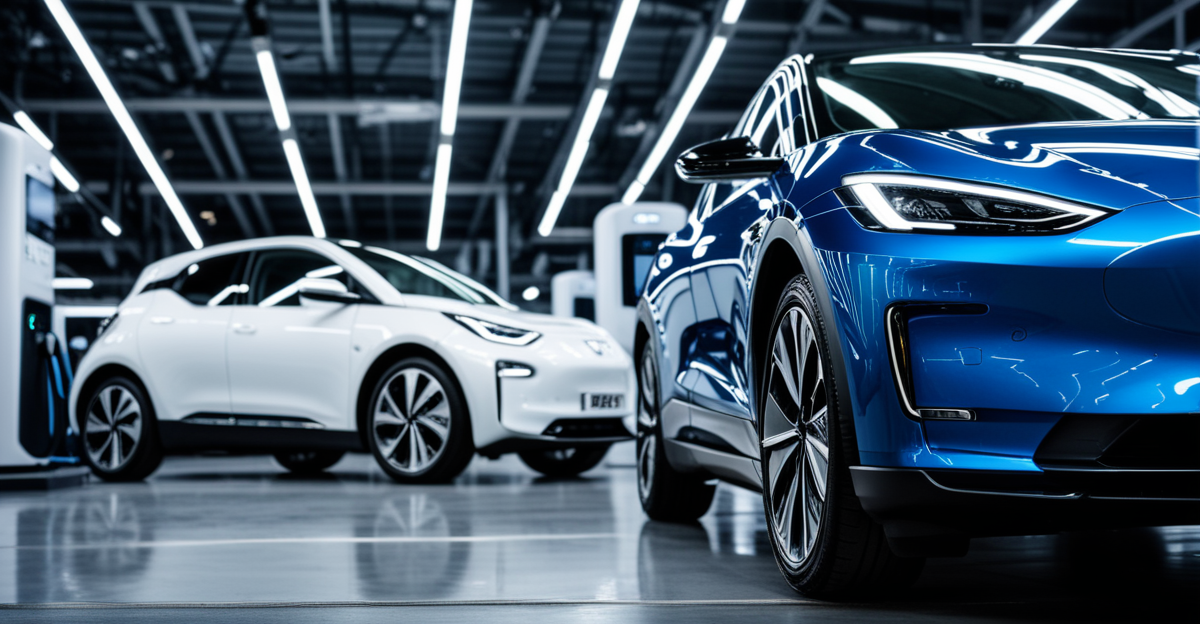Key Factors Driving the UK Automotive Industry’s Shift to Electric Vehicles
Several critical factors are steering the UK automotive industry toward a full transition to electric vehicles. At the forefront are government regulations and environmental targets, notably the UK government’s landmark ban on new petrol and diesel vehicles starting in 2030. This ban sends a strong signal to manufacturers and consumers alike, accelerating the shift to cleaner alternatives.
Environmental commitments play a vital role as well. The UK’s net zero target for 2050 demands substantial reductions in emissions across all sectors, with the automotive industry being a significant contributor. Adopting electric vehicles helps cut greenhouse gas emissions and aligns with the country’s broader climate goals, reinforcing sustainability as a key driver.
Also read : What strategies are UK car companies using to reduce emissions?
Market trends are equally influential. Consumer preferences in the UK are rapidly evolving as awareness of environmental issues grows. Many buyers prioritize cost savings, lower maintenance, and fuel efficiency, all of which electric vehicles offer. This shift in consumer demand is pushing manufacturers to innovate and invest heavily in EV technology to meet expectations.
Speaking of investment and innovation, the UK automotive industry is responding robustly. Major manufacturers are committing large-scale investment toward electrification, developing advanced battery technologies, improving vehicle range, and expanding the charging infrastructure. These efforts not only enhance the performance and accessibility of electric vehicles but also stimulate economic growth, create new jobs, and build expertise in cutting-edge technologies.
Have you seen this : How Will Sustainable Practices Shape the Future of UK Automotive Industry?
Together, these transition factors—regulatory frameworks, environmental imperatives, changing market demand, and industry innovation—form the foundation of the UK automotive industry’s electric vehicle transformation.
Government Policies and Regulatory Influence
Government policies form a pivotal part of the UK automotive industry’s transition to electric vehicles. The 2030 ban on new petrol and diesel vehicles is among the strongest regulatory measures enacted globally, directly setting a firm deadline that compels manufacturers to accelerate their production of electric vehicles. This policy drastically narrows the market for combustion engine cars, effectively pushing the industry to prioritize EVs to remain competitive and compliant.
Financial incentives also significantly boost electric vehicle adoption. The government provides various grants and subsidies that reduce the upfront cost of EVs for consumers. These include purchase incentives and funding for home charging installations, which lower the barriers to entry. Such incentives are crucial in encouraging buyers to switch from petrol or diesel vehicles, helping to meet policy-driven emission targets.
Additionally, regulatory pressures on manufacturers extend beyond vehicle sales. Automotive regulations now mandate stricter emissions standards and fuel economy targets. Failure to comply can result in heavy fines, directly affecting manufacturers’ profitability. This regulatory environment motivates firms within the UK automotive industry to innovate in electric vehicle technology and production processes to meet compliance requirements efficiently.
Together, these government incentives and stringent regulations create a powerful framework that drives the UK automotive industry’s swift and decisive shift toward electric vehicles.
Technological Advancements and Market Readiness
Technological progress is a cornerstone of the UK automotive industry’s transition to electric vehicles. Innovations in EV technology have significantly improved battery efficiency, allowing vehicles to travel longer distances on a single charge. This enhancement in range addresses a major consumer concern, making electric vehicles more practical and appealing.
Alongside battery improvements, the UK is expanding its charging infrastructure rapidly. Public and private investment is funding the installation of fast chargers across urban and rural areas, reducing “range anxiety” and increasing convenience for EV owners. This growing network is crucial for enabling seamless long-distance travel and daily use.
Costs associated with electric vehicle technology are also decreasing. Advances in battery manufacturing and economies of scale are lowering prices, making EVs more accessible to a broader demographic. These technological gains, combined with improved infrastructure, position the UK automotive industry to meet rising market demand effectively and support the broader shift toward sustainable transportation.
Industry Investment and Economic Impact
The UK automotive industry is undergoing a profound economic transition driven by substantial automotive investment UK in electric vehicle production. Leading manufacturers are allocating significant resources to develop EV manufacturing capabilities, reflecting both compliance with regulatory demands and a strategic move to secure a competitive edge globally. This level of investment directly fuels innovation in battery technology, vehicle design, and production efficiency.
One major consequence of this investment surge is its positive impact on employment within the sector. The shift to EVs is creating new roles focused on advanced manufacturing techniques, battery assembly, software development, and charging infrastructure deployment. These jobs require specialized skills, prompting manufacturers and government bodies to foster training programs that support workforce reskilling and skills development—ensuring the UK remains a leader in automotive technology.
Additionally, the transition reshapes supply chains as the industry integrates components suited for electric vehicles, such as lithium-ion batteries and power electronics, sourcing materials more strategically. This evolution strengthens the UK’s position in the international market by encouraging collaborations and competition with foreign EV manufacturers, thereby enhancing economic resilience.
Overall, investment in the UK automotive industry’s electric vehicle sector powers economic growth, diversification, and global competitiveness while supporting long-term sustainability goals.
Consumer Demand and Changing Preferences
Consumer preferences are a powerful transition factor shaping the UK automotive industry’s shift to electric vehicles. Growing awareness of environmental issues has notably influenced UK consumer trends, pushing many buyers to prioritize sustainable options. This shift is no longer just about novelty; it reflects a widespread desire to reduce personal carbon footprints and support cleaner technologies.
The evolution in UK consumer trends shows a clear preference for vehicles that offer cost savings, lower maintenance, and superior fuel efficiency. Electric vehicles excel in these areas by providing cheaper running costs compared to petrol and diesel counterparts, largely due to lower energy prices and reduced mechanical complexity. This economic appeal is a compelling incentive, especially for budget-conscious consumers seeking long-term savings.
Market demand is also shaped by greater confidence in EV technology, supported by clearer public messaging and positive media coverage. Automakers and policymakers actively promote the benefits of EV adoption, helping to reduce skepticism and raise awareness about performance, convenience, and environmental impact. As a result, more consumers are considering electric vehicles as practical and desirable choices for everyday use.
Together, these factors—heightened environmental consciousness, economic advantages, and strategic messaging—fuel increasing UK EV adoption, compelling manufacturers to focus innovation and investment on meeting evolving market demand.
Industry Investment and Economic Impact
Investment plays a crucial role in the UK automotive industry’s transition to electric vehicles. Major manufacturers are committing significant resources to enhance production capabilities, focusing on automotive investment UK that drives innovation in battery technology, vehicle design, and manufacturing processes. This commitment not only ensures compliance with evolving regulations but also helps secure a competitive global position.
The shift to electric vehicles is reshaping the industry’s economic landscape, creating new employment opportunities. As the sector transitions, demand grows for specialized skills in areas like battery assembly, software engineering, and charging infrastructure installation. These changes stimulate workforce development programs and foster an environment conducive to continuous skills enhancement, essential for sustaining the industry’s growth.
Supply chains are also undergoing transformation with a focus on sourcing key components unique to EVs, such as lithium-ion batteries and advanced power electronics. This evolution bolsters the UK’s role in the international EV market, enabling collaboration and competition with global manufacturers. Ultimately, automotive investment UK in electric vehicle production is pivotal for economic diversification, job creation, and strengthening the industry’s long-term sustainability.








